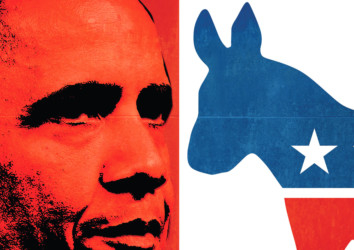
Less than one week before the midterm elections, US President Barack Obama has, in many parts of America, become the man who was not there. Swing-state Democrats are afraid to mention his name in public and consultants are cringing over interviews in which Obama has proclaimed that the upcoming election represents a referendum on his administration’s policy initiatives.
Welcome to midterm elections featuring an unpopular incumbent.
Obama’s low approval ratings, predictions of low voter turnout and the president’s own halting performance on foreign policy matters have given Republicans a perfect storm of fear and anxiety as the election approaches. Journalists and pundits are having a field day, with conservatives and liberals alike blasting the president as the bystander in chief who appears clueless as the world around him burns. The Ebola outbreak, Daesh (Islamic State of Iraq and the Levant) insurgency and racial tensions in Ferguson, Missouri have inspired cautious deliberation rather than bold leadership from the Obama administration — a posture that has caused his enemies to pounce and friends to retreat.
The Obama brand is undeniably damaged, but it is still the best brand the Democratic Party has.
The coalition of voters who elected Obama to the White House in 2008 and 2012 seek more, not less, progressive government, public-policy reforms and social justice. Yet, Democratic candidates currently running away from the president and his record now do so out of a belief that this is the pragmatic route to getting elected in typically red states like Alaska and purple states like New Hampshire.
But states are not nations. The Democratic Party nominee in 2016, like it or not, will effectively be running for Obama’s third term. Similarly, George H.W. Bush promised a continuation of Ronald Reagan’s legacy in 1988 and won. By contrast, Al Gore distanced himself from popular but scandal-plagued Bill Clinton in 2000 and lost.
The likeliest Democratic presidential contenders — Hillary Clinton, Maryland Governor Martin O’Malley, New York Governor Andrew Cuomo, et al — can win only by convincing the almost 67 million Americans who voted for the president in 2008 and the almost 65 million who re-elected him four years later that they share Obama’s priorities.
Obama steered Democrats to two consecutive presidential-election wins, not by appealing to moderates and centrists but by expanding the pool of voters and following the demographic wave that made voters of colour more powerful than ever.
Democrats would be wise to concentrate on this more virtuous side of the ledger this election season. The administration’s policy victories include the Affordable Care Act, the stimulus bill, environmental reforms and efforts to wind down two wars started by Republicans.
The idea that Obama has become an albatross around the necks of Democrats is true only so far as midterm elections go. In two short years, amid assessments of the president’s accomplishments, failures and ultimate legacy, Democrats will be scrambling to raise funds and expand the electorate for the next election cycle. Obama’s stature will seem more formidable, once again, as voters look to see which candidate the president whom they supported ultimately endorses.
Yes, at times, the president has been his own worst enemy, appearing tired and disinterested in recent stump speeches for Democratic candidates in places like Maryland, where his presence on the campaign trail is still seen as a positive. He’s never enjoyed the handshaking, schmoozing and social interaction that Bill Clinton loved-something that still inspires resentment among elected officials and Washington insiders.
But like it or not, Obama and the Democratic Party are stuck with each other. Democrats in 2014 and 2016 can continue to distance themselves from the president at their own and the party’s peril. Obama’s brand, however flawed, is already guaranteed a powerful legacy of its own.
— Washington Post
Joseph, a contributing editor at The Root.com, is founding director of the Center for the Study of Race and Democracy and a Tufts University history professor. He is also a fellow for Harvard’s W.E.B. Du Bois Research Institute and author of Waiting ‘Til the Midnight Hour: A Narrative History of Black Power in America, Dark Days, Bright Nights: From Black Power to Barack Obama and Stokely: A Life.








